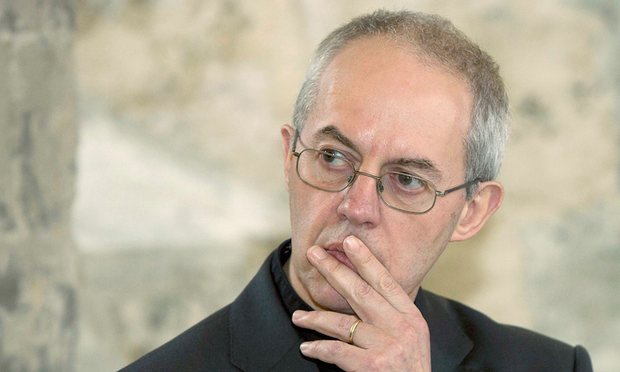Church "Could Have Done More" over John Smyth Abuse Claims
By Kevin Rawlinson and Harriet Sherwood
The Church of England should have done more to investigate allegations that young boys were abused by a former colleague of the archbishop of Canterbury, its top safeguarding official has said. The archbishop, Justin Welby, said he was told in 2013 about the claims made against John Smyth, with whom he had worked in the 1970s at a Christian holiday camp. Police had been notified of the allegations at the time, he said in a statement. Channel 4 News reported that Smyth, the chairman of the Iwerne Trust, which ran the camps for public school pupils, had been accused of decades of abuse. Three people claimed they had been beaten by him. Graham Tilby, the church’s national safeguarding adviser, said: “Clearly, more could have been done at the time to look further into the case.” Speaking on LBC Radio on Thursday, Welby said he had been “completely unaware” of any abuse when he worked at the camp. “I was at that particular camp in the mid-70s. I was young then – 19 to 21 or 22 – and I was completely unaware of any abuse. I never heard anything at all, at any point. I didn’t have the slightest suspicion at all. “As I recall him, he was a charming, delightful, very clever, [a] brilliant speaker. I wasn’t a close friend of his, I wasn’t in his inner circle or in the inner circle of the leadership of the camp, far from it. “And then I went off to work in France in 1978, which is when I am told the abuse began. It may have been earlier or later, I don’t know, and I was abroad during the time the report was done and had no contact with them at all.” The archbishop said he was first informed of the alleged abuse in late 2013 or early 2014. “I was told the bishop of Ely – it fell within his diocese – had been informed by a survivor of what had happened and had written to the police so we checked that indeed the police had been contacted immediately as per the church rules.” One of the alleged victims, Mark Stibbe, told Channel 4: “It was along the lines of: this is the discipline that God likes, this is what’s going to help you to become holy.” Richard Gittins, who said he met Smyth at Magdalene College, Cambridge, said the alleged victims had to wear nappies to help their wounds heal. “We used to have to put nappies on and at Magdalene we had a formal hall where you’d have grace, and then everybody would sit down together. “And, in the process of sitting down, we perfected the ability to sit down really quickly, before your bottom touched the chair. And, in the last couple of inches, you’d just ease yourselves down so it didn’t look like you were in any pain.” Another man, who spoke to Channel 4 anonymously, reportedly said he grew so fearful of the beatings that he tried to kill himself in 1981, prompting the trust to draw up a confidential report the following year. “The scale and severity of the practice was horrific … eight received about 14,000 strokes: two of them having some 8,000 strokes over three years,” the report said, according to the programme. A senior figure at the trust then reportedly told Smyth to leave the country. Following the revelations, the church said that when it was “alerted by a survivor, through the diocese of Ely in 2013, the police were immediately informed, as was the Anglican church in South Africa, where Mr Smyth was then living”. Welby said that after Smyth left the country it was not in the jurisdiction of the British police. “We were sure it was being rigorously handled by the bishop of Ely, according to the normal way the church does it.” Welby said he had only had fleeting contact with Smyth since. “I have a vague feeling I may have had a Christmas card in the 1990s and when I was living in Paris he passed through and I shook hands with him. That was the limit.” In his statement, the archbishop confirmed he had worked with Smyth at the Iwerne holiday camp in the late 1970s and had exchanged the “occasional card” with him. It acknowledged that he had been informed of the allegations in 2013. “The archbishop has repeatedly said that he believes that the safeguarding of children and vulnerable adults should be a principal priority in all parts of the church and that any failings in this area must be immediately reported to the police. “The archbishop is on the record as saying that survivors must come first, not the church’s own interests. This applies regardless of how important, distinguished or well-known the perpetrator is.” In addition to his statement on Smyth, Lambeth Palace issued a separate statement apologising for the church’s failures in dealing with cases of abuse. The archbishop said: “We recognise that many institutions fail catastrophically, but the church is meant to hold itself to a far, far higher standard and we have failed terribly. For that the archbishop apologises unequivocally and unreservedly to all survivors.” Tilby said: “We echo the archbishop’s unreserved and unequivocal apology to all the survivors and are committed to listen to anyone who comes forward and we would urge anyone with any further information to report it to the police.” Responding to the allegations, Smyth told Channel 4 News: “I’m not talking about what we did at all.” He called some of the claims nonsense and declined to respond to further requests.
|
.
Any original material on these pages is copyright © BishopAccountability.org 2004. Reproduce freely with attribution.
